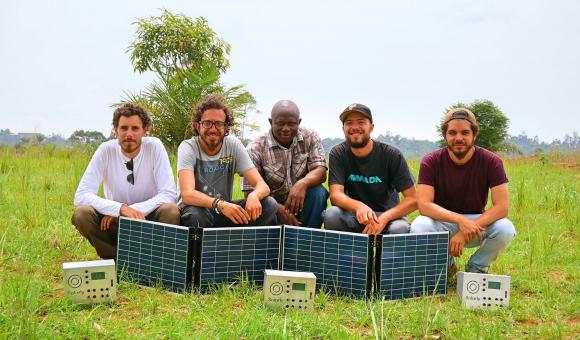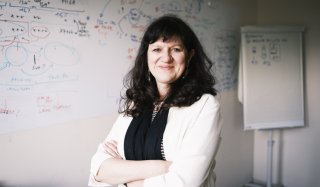
Today, more than 650 million people in Sub-Saharan Africa, or two out of every three individuals, have no access to electricity. Energy poverty is one of the main obstacles to development. Lack of access to this service has negative consequences in areas as varied as health, education, access to water and agriculture. National electricity companies and private operators are currently less focused on rural areas (where the electrification rate is below 23%). The only alternative for these populations is the use of fossil fuels, which is unsatisfactory and harmful to their health.
It was based on this observation that Julien, Jean-Grégoire, Thomas and Michel, the members of Solarly in Belgium, devised, designed and manufactured connected, modular and affordable solar stations within the Nest'Up incubator. These solutions provide a perfect response to the energy needs of households, small businesses and community buildings in Sub-Saharan Africa. Their objective is to provide green energy and support services in regions which are not served by national electricity grids. Their solar stations offer easy access to electricity, as well as income opportunities and energy independence for users.
Sustainable solutions
Solarly's solar stations offer a sustainable, autonomous and connected solution. Designed and manufactured in Belgium, they combine three advantages: they are connected (via a "SIM" card, which allows remote management of the device), modular (can be scaled to energy needs) and autonomous (the user does not depend on a network). They consists of a "box" equipped with eleven outputs (12 volts, USB...), one or two solar panels, a battery and a set of lamps. All this allows a household, a business or a community building to power a series of appliances (telephone, TV, fridge, computer...). Finally, as is the case in many African countries where the "mobile wallet" is highly developed due to a very high smartphone penetration rate, the customer can pay for their "box" in instalments.
Solarly installs these solar systems in areas with no or little access to the electricity grid, providing easy access to electricity, income opportunities and energy independence for rural households. Connectivity allows it to offer an after-sales service and payment plans in order to facilitate the acquisition of these solutions by its users. Moreover, the solutions proposed by Solarly can be adapted to the energy needs of the users, which makes it a modular solution, suitable for households, small businesses or community buildings.
Business model based on the entire value chain
Solarly is one of the few market players positioned along the entire value chain, from design to distribution. Thus, the distribution model is a combination of B2C (payment plans), B2B and B2G (contracts). Partnerships with already established distributors (B2B) and government organisations (B2G) are favoured in order to boost sales volumes and release themselves from last mile logistics. With this in mind, Solarly has just been awarded a contract for 500 units to electrify health centres in Cameroon. In addition to its product, Solarly also intends to develop a consulting activity for larger-scale projects in order to enhance its expertise.
Sustainable long-term impact
Having energy provides access to services that are essential to every human being, such as education, the internet and lights after sunset. For households, the energy produced is free of charge once the cost of the solar station has been repaid. The amount of money saved and access to energy allows users to develop income-generating activities. In addition to the social impact, Solarly has a positive impact on the environment and health. This is particularly true for the 400 medical centres that Solarly will electrify (part of the contract with the Cameroonian Rural Electrification Agency) in which many procedures, including childbirth, still take place in the dark or with the help of generators. The use of solar systems instead of polluting fossil fuels reduces greenhouse gas emissions and fumes that are harmful to health.
Source et photo: Solarly







